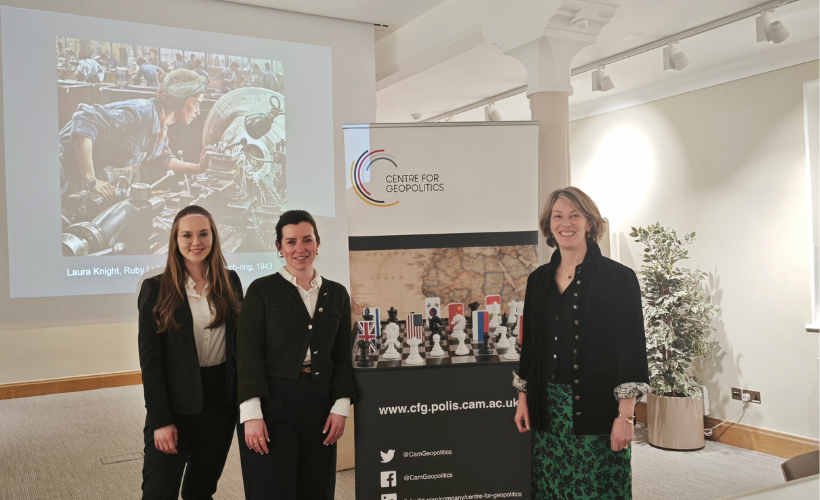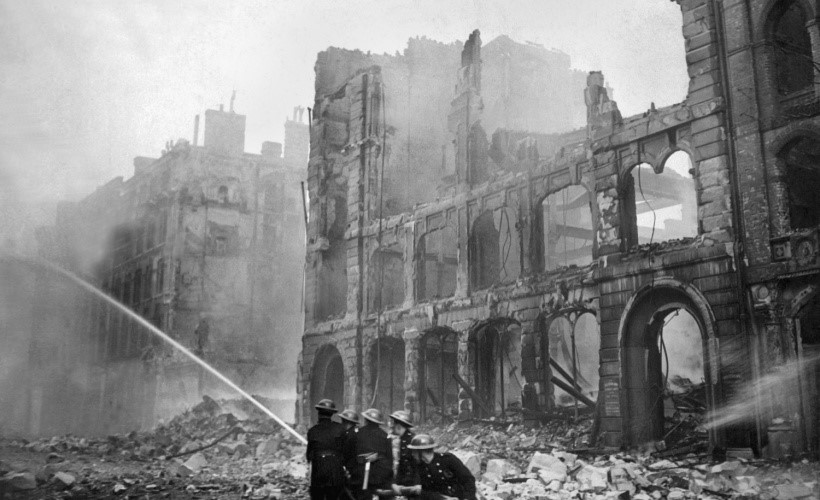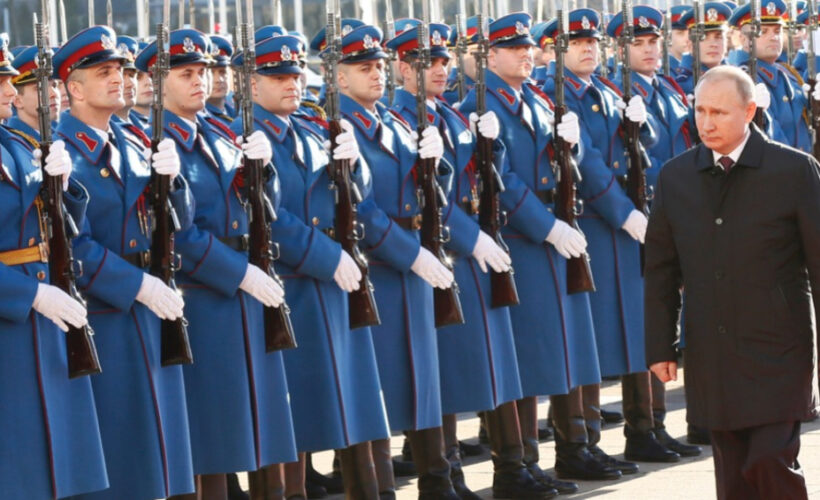On 21 September, the Centre for Grand Strategy at KCL and the Centre for Geopolitics at Cambridge, in conjunction with the Axel and Margaret Ax:son Johnson Foundation, hosted an online workshop for the trans-Atlantic Applied History Network. The three-hour session was comprised of two panels—one on methods and approaches to applied history, and another on the ruptures and catastrophes in history—as well as a group discussion on the future direction of the Applied History initiative. A brief summary will be provided here.
Panel 1: ‘Debates with Historians: Patterns, Generalizations and Laws in Historical Study’
The first panel brought together Professors Mary Sarotte, Philip Zelikow, and Frank Gavin (chair) for a discussion about their own methods and approaches. Professor Gavin opened the panel by highlighting the combined work of Professors Sarotte and Zelikow. Among their many achievements, Gavin noted, three characteristics stood out: their ability to marry the micro and the macro levels in historical research and writing; the empathy they display for decision-makers, including viewing decisive moments ex-ante as opposed to ex-post; and the fact that where International Relations scholars might, at times, focus on material factors, Sarotte and Zelikow take into account cultural, intellectual, and spiritual factors.
Professor Sarotte put forward an intriguing point relating to how she “applies” an aspect of her own historical method. Central to her approach is a focus on the intersection of location, times, and knowledge when analysing a particular historical decision. Moving into how this might be applied, Sarotte focused on the importance of approaching the past through many portals. Suggesting that the way in which she approached historical sources—namely through a focus on the location of historical actors (i.e. close or distant from the central action), the time during which they were involved in the action, and the extent to which they understood what was transpiring and why—can provide an important framework for how policymakers view the significance of contemporary decision-making.
Professor Zelikow followed with remarks that centred on two key points: the need to avoid “axiomatic thinking” and the value of the “historian’s microscope.” Concerning the former, Zelikow referenced a speech by Edmund Burke in the House of Commons in October 1793, in which the British statesman warned against being “led in error” by false uses of history. The most dangerous use of history, in Zelikow’s view, was the push by some scholars—whether in history or other related disciplines—to develop laws or lawlike generalisations, the methods of which are rooted in the natural sciences. He referred to what he described as the “n+1 fallacy”, whereby scholars might derive a probability from 100 case studies and mistakenly assume that this applies to the 101st case (instead of the next 100 cases). For the policymaker, he said, every case is no more than the next case, the n+1 case; and in such a single case, the probability—a priori, knowing nothing about the case except that it is a relevant case— is unknown, statistically. Zelikow’s next point was the value of what he called the “historian’s microscope.” By studying events, periods, and actors in detail, he suggested, historians should in principle gain a much better understanding of processes. Moreover, for those hoping to develop broader generalisations, these macro-level claims would need to be backed up, in the first place, by the micro-level detail.
Discussion of Panel 1: Professor Gavin opened the discussion with an acknowledgment that axiomatic thinking, while unpopular with many historians, does exert a powerful pull on scholars hoping to be relevant to contemporary policymaking. Citing Isaiah Berlin’s famous essay on “The Hedgehog and the Fox”, he noted that big themes often generate attention, and one only needs to look at the popularity of scholars like Francis Fukuyama, Kenneth Waltz, and John Mearsheimer. Oliver YuleSmith of King’s College London inquired about the relationship between contemporary history and applied history, asking whether the two should be separated. Professor Graham Allison, one of the founders of the Applied History initiative, then offered his thoughts on Professor Zelikow’s point about axiomatic thinking, highlighting that not only did he fundamentally disagree with this argument but that it was “wrong-headed and misleading.” Challenging Zelikow’s n + 1 fallacy, Allison argued that even in light of the infinite number of variables that comes after a formula is developed, policymakers still need to apply analytics to the situation to discern what the variables might be. He reiterated that historians being able to speak in a policy framework is key and that they cannot simply reply to the policymaker that “it’s complicated.”
Professor Fredrik Logevall joined the discussion and pointed out that where professional historians tend to try to study the past “for its own sake”, applied historians begin with a contemporary event and work backwards. He then asked how often a policy failure was the result of a lack of information, historical or otherwise. Citing the example of information streams during parts of the Vietnam War (especially about political dynamics in South Vietnam), he suggested that more often than not, there is a glut of information available to policymakers—so is the question one of historical research or the way that it is valued by decision-makers? Professor Sarotte responded by explaining what she viewed as the “data science hierarchy”, which ran from data to information to knowledge to wisdom. Historians—who she noted were sometimes the “hicks of the garden party”—were very good at moving from data to wisdom, but policymakers are often not convinced of this. These officials need to be better convinced of the utility of historical tasks. Picking up on Professor Logevall’s point, Professor Zelikow noted that, more often than not, the problem was not one of information but of policy design and policy engineering. Any engineering task requires real detail, he said.
Rikard Westerberg of the Stockholm School of Economics asked whether there were any types of axioms useful to the historian and policymaker. This was followed by William Reynolds of King’s College London who asked about the difference between axiomatic thinking and institutional memory, in the context of official policymaking. Professor Zelikow listed several minor ways that axiomatic thinking can be useful, but he reiterated that history was excellent for suggesting possibilities but not probabilities. Professor Sarotte added that going forward, it would be important for historians and policymakers to be in the same room together, in order to understand how the former can better influence the latter on questions of practical policy.
Panel 2: ‘Ruptures in History: How Catastrophes Shape Contemporary Experience and Historical Study’
Professor Beatrice de Graaf highlighted the importance of using applied history during crises, to assist affected societies and their elites in developing and applying coping mechanisms. Overall, such historical work would allow for a more fine-grain view of the present. She provided three overarching points during her talk. The first dealt with the fact that throughout advanced countries there has been a series of so-called transboundary crises (geographically, disciplinary) with which the public and government have had to deal. Whether financial, environmental, or otherwise, these crises have affected societies across the world; their solutions are transnational and of a magnitude much larger than previously seen and require new meaning-making skills. Next, policymakers were no longer able to suppress crises from public opinion. She noted that the ability to make sense of crises as they unfold is difficult but important work, especially as crises often expose cracks in larger frameworks within the public consciousness, and trigger 24/7 global public chatter. Finally, in light of the previous two points, 3 she noted that there is a need to properly historicise these crises as they happen. Professor de Graaf highlighted some of the work that she and her colleagues have been undertaking in the Netherlands, most notably an effort to produce historical material for primary and secondary education as crises unfold. She noted that during these moments, they were aiming to “take people back in time and space”, in order to provide essential historical context for current crises, and distance ourselves from claims to urgency, immediacy and necessity, thereby obscuring alternative paths for solution (or obscuring failure paths that should rather not be taken).
Professor Robert Gerwarth was the next speaker and began by explaining that, as a scholar of the First and Second World Wars, he normally sees himself as an ‘unapplied historian.” He noted that the two conflicts he studies, despite serving as driving forces for decades, have little relevance today. Civil wars have replaced inter-state wars, while ideologies present in the first half of the twentieth century are not nearly as prevalent or intense in the present day. So where does this leave us, he asked. He suggested that the world was in the midst of a transitory phase, in which the historical reference points were undergoing profound change. Where the two world wars had long served as the key historical reference points, these conflicts—and especially their memory across national societies—are no longer as relevant as they once were. He inquired as to the potential historical reference points which might take their place, and the effect these would have on national psyches, as well as the make-up of history and politics departments.
Dr Hisham Hellyer focused on the Nakba, or the ‘Palestinian catastrophe’, and how this historical moment continues to exercise a powerful political and social influence on contemporary events in the Middle East. The historical moment, and the popular narrative which surrounds it, live on in ways that colour the nationalist and religious lens of so many in the region, including amongst Israelis. Many scholars within Israel, he pointed out, have begun to accept the truth of the Nakba and have instead moved on to debating whether it was justified. His overarching point was in relation to the way in which history—and especially historical trauma—continues to exert a massive impact on how we view the world.
Professor Frank Dikötter’s presentation focused on what he considered to be three waves of catastrophe under Mao Zedong. He began with a quote: “the executioner always kills twice, the second time through silence.” Moving to a discussion of the first wave of catastrophe, Dikötter described certain aspects of the Communist Revolution, noting that the political upheaval and destruction of existing institutions not only marked a great rupture for the landed class, the elites and the liberal thinkers within Chinese society, but its wider effects lived on for decades thereafter, with perpetrators and victims living side-by-side. The next wave of catastrophe was from 1958-1962 with the Great Leap Forward during which people in the countryside were forced into collectives. The trauma from this period, which affected upwards of 45 million people, continues to live on to the present day. There remains a divided China, he noted, with those in city centres wealthier and those in the countryside enveloped in poverty. The third wave of catastrophe highlighted by Dikötter was the 1966 Cultural Revolution during which Mao pitted thousands of Chinese citizens against one another. He added a number of other points, including the fact that historians within China continue to be repressed today, as well as the fact that mainstream historiography outside of China tends to be dominated by certain narratives shaped by the PRC. Those historians who are viewed favourably within China tend to be those who focus on resuscitating the benefits of the revolution.
Discussion of Panel 2: To open, Professor Brendan Simms asked to what extent the importance of the 20th century is waning in its utility, in light of Professor Gerwarth’s comments. Professor de Graaf agreed with the proposition, contrasting great destruction caused by nation-states with the transnational challenge of climate change and international terrorism. Professor de Graaf posited whether there might be more utility in looking back to the 19th century for making sense of today’s collective insecurities and geopolitical anxieties; applied history may be used to consign modernity to history, 4 and question modern paradigms (such as liberal interventionism). Dr Hisham Hellyer suggested that the proposition applies to certain geographic areas more than others. Professor Dikötter drew attention to the tensions with this proposition at the outset when one considers areas in which history is suppressed.
Dr Bram de Ridder of the University of Leuven expressed interest in the public history project that Professor de Graaf mentioned and questioned whether there was a danger in the simplification of history in order to make that history accessible to a wide range of audiences and in such a short time frame. Professor de Graaf responded that historicising crises comes first, rather than providing simple ‘solutions’ or exits out of a crisis. Moreover, the team enlists the foremost experts on a particular subject before they translate the occurrences into crisis briefs for educational purposes. Moreover, there is a clear acknowledgement that the picture is never going to be comprehensive given the urgency of contextualising these crises but that as a coping mechanism, a historical context may serve as a point to pause and reflect when emotions run high.
Referring to the previous question, Professor Gerwarth stated that he agreed with his fellow panellists about the geographic relevance of the 20th century. As a European, he found that the Second World War used to be a rallying call for closer EU integration, but as that event fades into the background the EU needs to find a new message that binds people to closer EU integration.
Angus Reilly of King’s College London questioned how we should engage with the history of catastrophe and cataclysm as we look toward catastrophes and cataclysms of the future like climate change. Professor Gerwarth agreed that it was a challenge. Spanish flu killed more people than the First World War and yet it quickly faded into the background, as we are learning again to our detriment. Hisham Hellyer posited that one important issue going forward, that the 20th century reminds us, will be the ability to keep up with the increasing rate of change using the technology we have at our disposal.
Group discussion: On the Methods and Purpose of Applied History
To open the group discussion, Professor Brendan Simms (chair) asked how applied historians might go beyond two extremes—namely (1) how history is useful; (2) the past is another country. Dr Charlie Laderman of King’s College London asked how should historians, who have immersed themselves in a particular historical period, balance a focus on the particular with a view to the longer view of history so as to be better able to tease out those crucial inflection points for themselves but also for policymakers. Malin Severin, also of King’s College London, wondered whether, coming from a national historical perspective, it was possible to talk about the impact of moments of catastrophe in creating national trauma when your own country has largely not experienced a moment of national trauma in recent history. Professor Simms questioned how you convey the importance of applied history when something cannot be applied at present but might, at some point, be useful in the future.
Professor Sally Paine made three overarching points: the first was that Applied History is not new. Individuals and scholars have been applying history for decades. Second, she noted that within the Naval War College where she teaches, they provide students with concepts and frameworks from across fields (as opposed to providing them with axioms). Thirdly, on the subject of inter-disciplinary tension, she argued that the social sciences have lagged behind the inter-disciplinary relations in other fields, most notably the natural sciences. She noted that the problem with history was that it was a marginalised field, and she recommended that historians link up with other disciplines.
Dr Bram de Ridder drew attention to the opposition faced by the uniqueness of the concept of applied history stemming from public historians who have claimed to do this for a number of years before applied history was established as a distinct field of study. Oliver Yule-Smith agreed with Bram’s point but added that the challenges faced by different countries applied history disciplines are very different, 5 noting the challenge of distinguishing applied history from international relations in the US compared to the different challenge of proving that the applied historians are proper historians in the UK.
Dr Maeve Ryan of King’s College London noted that the Centre for Grand Strategy has been trying to develop a rising generation of applied historians with the inception of yearlong placements of PhD students within British government departments. She stated that the experience keenly draws attention to the real-world challenges of applying history and how to navigate those challenges. Professor Simms questioned whether one of the participants might briefly highlight any findings. Oliver Yule-Smith, who participates in the project, said that the experience was invaluable. He stated that the experience has taught him how to make history more accessible to policymakers and of the need to not to pretend to speak for all historians.
Dr Graeme Thompson of Harvard University noted that history is regularly invoked by policymakers, but usually as mythology or cliché. He cited his own experience as a policy planner within the Canadian Foreign Ministry. There is an impression, he said, that academic history is antiquarian—at best interesting, but not relevant. Professor Beatrice de Graaf suggested that historians, despite the solitary nature of their work, should team up more. She noted that historians might also team up with scholars in other disciplines who might be able to better speak to policy-relevant scholarship.
To close, Andrew Ehrhardt gave a brief summary and a vote of thanks to the sponsor of the programme, Mattias Hessérus of the Axel and Margaret Ax:Son Johnson Foundation, who in turn noted the immense value of this event and that of the wider Applied History Network.
Andrew Ehrhardt, Belfer Center for Science and International Affairs, Harvard University
Oliver Yule-Smith, Centre for Grand Strategy King’s College, London







